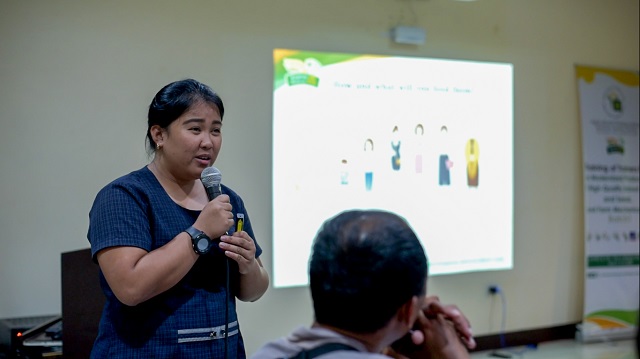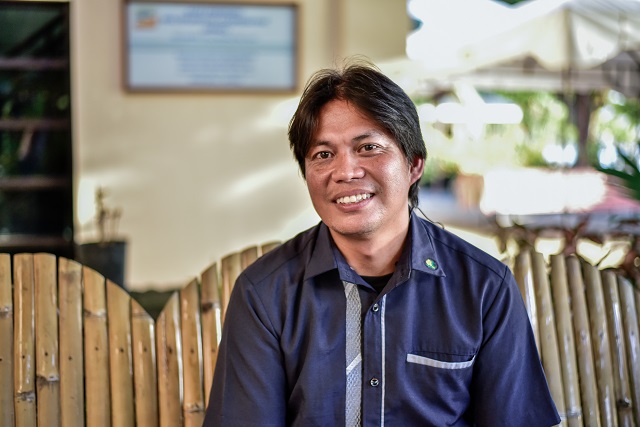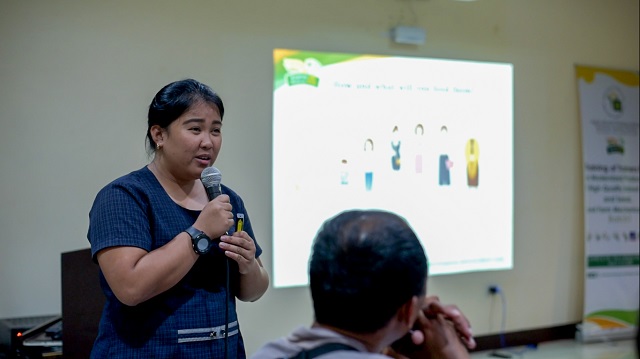
While we move our seeds, we also move knowledge as well as people especially the farmers.
To complement the seed distribution pursuits being waged across the country, PhilRice, together with ATI, PHilMech, and TESDA, is also multiplying its efforts to implement the Rice Competitiveness Enhancement Fund (RCEF) extension initiatives such as the conduct of the Rice Specialists’ Training Course (RSTC).
Lea dR. Abaoag, head of the Technology Management and Services Division, said RSTC is designed to develop the technical competence of the participants in rice and rice-based production technologies, specifically in diagnosing and managing field problems based on the concepts and principles of the PalayCheck and Palayamanan Systems. As a modified season-long course, the trainees will have to complete three modules through a period of 90 days.
Abaoag said the first batch of the RCEF-RSTC began in April 2019, finally producing 30 graduates from ATI regional centers and selected DA-RFOs. Meet some of the knowledge movers from this batch.
Dax Gabriel D. Morfe, 35 (Jaro, Leyte)

For Morfe, sharing his knowledge with farmers gives deeper meaning to his whole RSTC experience.
He said it is their responsibility as graduates to make knowledge flow from experts, such as those from PhilRice, to farmers making it favorable too for the farmers to also share their knowledge with their fellow food producers in their community.
Morfe confessed that before his RSTC involvement, his knowledge on rice was forgettable. He timidly recalled that when he went to a field to assess and validate a certain pest incident, all he could do was to photograph the damage, as he couldn’t confidently give any recommendation. But, after completing the RSTC, he said he can now credibly answer and elaborate on farmers’ queries.
From the training, he also realized that mere possession of technical knowledge does not make a rice specialist effective. He said one has to be passionate about helping rice farmers. Morfe has thought of dedicating his best time to sharing his knowledge to them.
- Excited
- Fascinated
- Amused
- Bored
- Sad
- Angry
In fact, he had led a recent training for new seed growers who were thankful that they learned new practices on pest, harvest, and post-harvest management. The future seed growers realized that excessive spraying of pesticides is not cost-efficient, and that timely and proper harvest and post-harvest management can maintain the viability and quality of the seeds.
With a heart full of hope, he looked forward to training more farmers to become seed growers. “In this way, I can help address my region’s problem on lack of seeds owing to the limited number of seed growers,” Dax Morfe concluded.
Junalyn F. Palco, 28 (Albuera, Leyte)

The conduct of RSTC is very important to increase the number of experts to cater to more farmers and extension workers, Palco said. Apart from having more hearts and minds to reach more farmers, the course helps rice specialists like them become competent and self-believing knowledge bearers owing to the new rice production technologies and practices that PhilRice and other experts impart to them.
Palco said that educating the farmers is a responsibility she shares with PhilRice and other agencies to help them increase their yield and reduce their production cost, to keep their loyalty to rice farming. Additionally, she is challenged to ensure that her knowledge and skills on rice production are regularly updated. With this, she intends to purchase or lease a portion of a rice field where she can apply her learnings from RSTC to better understand rice farming and the farmers, as well. She wants to be a “deep penetration agent”, so to speak, to outsmart her “enemies”.
“When a farmer-trainee expresses his or her intention to adopt a technology in the farm, this affirms what we profess as RSTC graduates,” Palco enunciated.
She vividly recalled that the farmers they trained appreciated the lesson on modified dapog. To her surprise, one farmer approached her and told her he would actually use this technology in his farm. They believe that this technology is useful and practical to them as it is less laborious to do.
Added to modified dapog, her trainees also appreciated the Minus-One-Element Technique app as it provides them with a recommended fertilizer rate that has scientific basis. Some farmers also said they are considering to shift to highly mechanized farming as this reduces labor cost. They also enjoyed the experience of operating farm machines. One farmer was so thankful he finally learned how to properly operate a tractor during the training even though the machine had long been available in his area. He was excited to brandish his new skill among his fellow farmers.
“These compliments and appreciation straight from the farmers keep us going,” Junalyn Palco said with a smile as though she was about to click a selfie.




